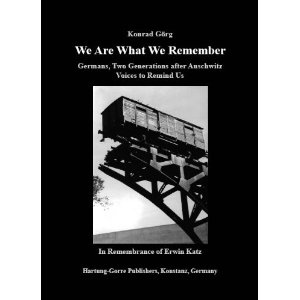„What should I tell you about our brother, the little blond whirlwind with his wide-awake blue eyes?“ asks Jolana, and then she talks so vividly about the happy child, and his short life that ended in Auschwitz, when he was only ten years old …

by Ramona Ambs, translated by Fritz Voll
Konrad Görg, author and internist, encountered this story on a visit to the cemetery with his friend Petr Abeles. On the tombstone of Petr’s mother Hilda were also the names of her parents and her little brother Erwin Katz with an additional small inscription:
In memory of those who have no grave
Konrad Görg asked for and got the story of Erwin Katz. And in his book he passes the story on so that it will not be forgotten. But he does not only tell the story of Erwin Katz – he collects voices and quotes by perpetrators, analysts and victims of persecution from the time before, during and after that period of time. And this collection of quotations reads differently and new against the background of Erwin Katz‘ story. They are no longer just historical comments and analyses, but their effective power becomes concrete in Erwin’s fate.
„The most dangerous enemy of memory is abstraction. In this sense, it is important to remember the „Victims of National Socialism“ not so much in anonymous and politically aseptic ways, but to learn again, for example, to tell stories: the story of this father, Shlomo Wiesel, this mother Lena Donat, this girl Eva Heymann, or of this boy, Erwin Katz …
‚The Holocaust is not six million, but One and One and One and One …“ is stated at the beginning of the book and becomes its guiding principle.
In the citations to social exclusion there is many a line that shows how a subtile hatred of the Jews was widespread, so that one could read in the Stuttgart Protestant Sunday paper of June, 1933, „Do not buy from Jews – The boycott on April 1, as well as further actions against the Jews, has caused in some Christian circles a certain conflict of conscience which they cannot overcome. This distress may have its origin in the fact … that they hardly know anything anymore about the serious dangers of all kinds by which the Jews threaten our people … It was the right of the German people to defend themselves with all available resources. Here to assist was the duty of the Christian as well… Whoever lets his people down when they are in danger, is not only a coward but sets himself against God’s will! …
A thinking that is estranged from one’s own ethnicity by seeing oneself as a citizen of the world, is not Christian because it denies the order of creation … “
Görg understands to compose the citations in a way that makes them tangible and concrete. The citation of the Protestant Sunday paper is followed by a brief description of Lilli Jahn about the increasing social exclusion and a quote from Blaise Pascal: „Never does one commit evil so completely and quietly than with a religious conscience.“
The book is not one that one only reads once and then never picks it up again. The many and various quotations, in particular those of the perpetrators, require much of the reader, so much so that one interrupts the reading again and again, needing the interruption. Yet it is precisely this diversity that guarantees that every reader will find something in this book, even find the one quote that becomes and remains one’s own, so to speak. Horst-Eberhard Richter writes in his preface: „Reading calls for pauses and perseverance, repeatedly, in order to allow the testimonies to be absorbed – and confrontation with the voices of perpetrators, accomplices and appeasers to be sustained.“ And so ends this review also with a quote from Hannah Arendt, taken from the book:
„To endure the truth
The highest one can achieve
is to know and endure
that it was so and not otherwise,
and then see
what it means – for today.„
Konrad Görg: We Are What We Remember
Forewords by Horst Eberhard Richter and by Erhard Roy Wiehn
1st Edition 2010, 116 pages. € 9,95, 1st Edition 2010 as eBook. US $ 9.15, ISBN 978-3-86628-342-8



Leserbriefe